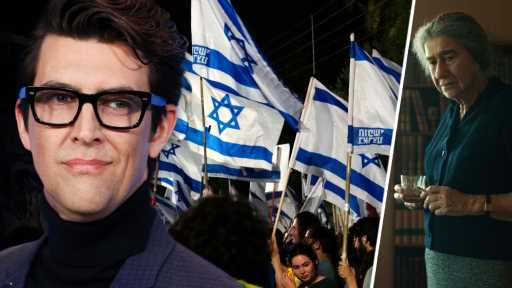L.A.-based director Guy Nattiv is back in his native Israel with new film Golda starring Helen Mirren as Israeli Prime Minister Golda Meir.
The drama, focused on Meir’s controversial handling of the 1973 Yom Kippur War, opened the Jerusalem Film Festival on July 13, with Mirren squeezing in an appearance just hours before the SAG-AFTRA strike was declared.
The picture originally world premiered at the Berlinale in February, but for Nattiv the Israeli premiere is equally if not more momentous.
Related Stories
 Festivals
Festivals
Oliver Stone Shocked By 'Oppenheimer' SAG-AFTRA Strike Cast Walkout; Says Roots Of Writers Strike Lie In 1988 Deal – Jerusalem Film Festival
 Labor
Labor
Helen Mirren Gives Shoutout To "My Tribe Of Actors' At Jerusalem Film Festival As SAG-AFTRA Strike Hits: "Actors Are Wonderful People"
“I’ve been waiting for this moment,” Nattiv tells Deadline in Jerusalem.
The director believes the film will chime with current debates in Israel on both its past and future.
“It’s kind of an Israeli movie with an international swagger,” he says of the English-language production, starring a mixture of international and Israeli stars who also include Camille Cottin and Lior Ashkenazi. “It has another layer that I think non-Israelis don’t get.”
Tel Aviv-based United King Films will release Golda in Israel on 50 to 60 copies on August 24, just six weeks shy of the 50th anniversary of the 19-day Yom Kippur War which began October 6, 1973.
The conflict – in which Israel was caught on the back foot by a military offensive involving a coalition of Arab states led by Egypt and Syria – remains a painful chapter in the country’s 75-year history.
More than 2,600 Israeli soldiers, many of them reservists, died in the fighting, and another 11,000 were injured, while between 8,000 to 18,500 men are believed to have died on the Arab Coalition side.
There is anger in Israel to this day over the handling of the war by Meir, Minister of Defense Moshe Dayan and Chief of General Staff David ‘Dado’ Elazar, played respectively by Rami Heuberger and Ashkenazi.
“A lot of veterans are watching this film. They have so many scars. It brings them back to ‘73,” says Nattiv.
He suggests Golda has also gained contemporary relevance amid the political crisis prompted by a move to overhaul the Israeli judiciary by the right-wing government of Prime Minister Benjamin Netanyahu.
Hundreds of thousands of Israelis have been taking to the streets in regular demonstrations since early January to protest the reforms they say will destroy freedom of expression and rule of law in Israel.
Nattiv, who has been joining demonstrations with his father in and around Tel Aviv, recounts meeting Yom Kippur War veterans at the protests who believe the reforms pose as big a threat to the future of Israel as the 1973 war.
“This is the Yom Kippur War for the democracy of our country. I’ve met veterans at the demonstrations who believe they are fighting a new battle for the future of their children and grandchildren,” he says, sharing photos on his i-phone of men in their 70s, sporting slogan t-shirts declaring their opposition to the reforms.
He adds that while Israeli public opinion on Meir remains divided, there is a nostalgia in the country for politicians of her stature.
“We miss leaders like Golda, Shimon Peres and Yitzhak Rabin that took responsibility and didn’t point fingers,” he says.
Nattiv bats back suggestions that the film is attempting to rehabilitate Meir and could also stoke nationalist sentiment in its portrayal of the country’s fight for survival against outside enemies.
“What I’m showing is the defeat of Israel, it’s downfall. I call it the ‘Requiem of Golda’. Everybody’s losing themselves, the heroes from ’67, figures like Moshe Dayan, the big hero, the superman of Israel, he’s getting a slap,” he says.
“It’s not glorifying anything about the Israeli narrative. The ‘Yom Kippur of’ is a term that everybody uses here, the ‘Yom Kippur of Maccabi Tel Aviv’, the ‘Yom Kippur of Eurovision’… This is like the Vietnam of Israel.”
Nattiv suggests Meir is a tragic figure, who missed out on the opportunity to make peace with Egyptian President Anwar Sadat but lived to see right-wing Prime Minister Menachem Begin strike a lasting accord just two months before her death in December 1978.
“It’s tragic. It’s kind of a requiem for a leader, a woman leader, who is the wrong person, in the wrong time, in the wrong place but is an amazing stateswoman – there’s so many nuances to that.”
There has been pushback against the film following its Berlinale premiere from media outlets in the Arab world, where Meir is a controversial figure for her treatment of the Palestinians and affirmation that they did not exist as a people prior to the creation of Israel in 1948.
Nattiv says the narrow focus of the film on Meir through her handling of the Yom Kippur War did not warrant a wider exploration of her attitudes towards Palestinians.
“It’s not a classic biopic. It’s focusing on 10 days in the world. No-one was speaking about the Palestinians while we were fighting the Egyptians,” he says.
“If I had been making a miniseries with five, six episodes, I would definitely show how Golda was basically treating the Palestinians as if they were no-one. It was another hubris. That was the Zionist approach, ‘We are here to stay, and who are you?’”
He notes, however, that the opening scene of the film features real-life news footage of Palestinians being driven from their homes during the 1948 Arab-Israeli War
“It was important for me to say this is part of Nakba,” he adds, alluding to the Palestinian term for their defeat in 1948. “I have Palestinian friends back in L.A.”
Alongside promoting Golda, Nattiv has also been wrapping post-production on his freshly titled film Tatami, starring Zar Amir Ebrahimi as an Iranian female judo champion drama who defies Iran’s Islamic Republic regime.
“It was an amazing collaboration and she brought her personal layers,’ says Nattiv of Amir Ebrahimi, who fled her native Iran 20 years ago and has been living in exile ever since.
He is also getting closer to shooting his long-announced feature Harmonia, inspired by the real-life tale of his grandmother who left Israel to live with a female cult leader in Virginia, from which she was then rescued by Nattiv’s mother and aunt who were in their 20s at the time.
It’s very emotional to see this family story come to life,” he says.
Nattiv, who has secured a high-profile cast for the female-led tale, was planning to shoot the film later this year but admits this uo in the air due to the SAG-AFTRA strike.
In the meantime, United King Films is ramping up the promotional campaign for the Israeli release of Golda in the coming weeks.
We’re going full force with it,” says Acquisitions and Distribution Manager Avital Rosen. “Especially now with the political situation, it’s a film that will talk to a lot of people”.
Must Read Stories
Faith Series & Rebel Wilson Movie Granted Exemptions; Nolan On Pause; Moody’s Forecast

Elton John Takes The Stand As Defense Witness; Actor Weeps In Court

Without An ‘RRR’ Or ‘K.G.F.’, India’s Box Office Falls 15% In The First Half Of 2023

Cruise Pic Sets Franchise U.S. Five-Day Opening Record With $80M, $235M Global

Read More About:
Source: Read Full Article

